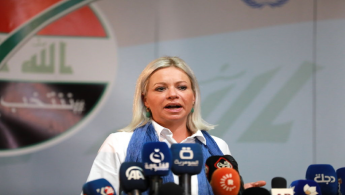UN envoy to Iraq approves of election results, warns against 'illegal' attempts to overturn
UN Special Envoy to Iraq Jeanine Hennis-Plasschaert has said that last month’s parliamentary elections in the country were generally transparent and not rigged, warning against attempts by pro-Iran factions in Iraq to discredit the poll results.
"They [the elections] were generally sound, and the administration showed clear technical and procedural improvement and represented a great achievement that the Iraqi authorities and parties should acknowledge," Plasschaert said in a statement to the UN Security Council on Tuesday.
It comes after Iran-backed Iraqi parties and militias claimed that votes were tampered with after the bloc faced a massive blow in the 10 October polls where they lost a majority of seats.
"Any illegal attempts aimed at discrediting the process… or worse, altering the results through intimidation and pressure, will only lead to counterproductive results," she said, as she called on these factions not to resort to such behaviour.
"So far, and as the Iraqi judiciary has stated, there is no evidence of systematic fraud, and any electoral concerns that still exist must be dealt with through the existing legal channels exclusively and in accordance with the law," Plasschaert explained.
The UN envoy stressed that it was not permissible under any circumstances to resort to terrorism, violence, or any other illegal acts to derail the democratic process in Iraq, noting that "in order to reduce tensions, calm, restraint and dialogue represent the only way forward".
She warned of the risks of prolonging the political impasse amid the long list of challenges still facing Iraq.
Iran-backed political forces in Iraq have in the past accused Plasschaert of interfering in the country's affairs and "overstepping" her role.
Her recent comments have been met with fierce backlash from these groups who accuse her of being biased towards a "US and Israeli agenda", while pictures portraying her as evil have been seen in Baghdad.
Shia cleric Muqtada al-Sadr, who came out victorious from the elections and won at least 70 of 329 seats in the new Iraqi parliament, making it the largest bloc, welcomed Plasschaert comments.
He wrote on Twitter that the statement gave hope and was a "good" recommendation to avoid political squabbling, violence, and destabilisation.
"It is a new opportunity for those who reject the election results to reflect and accept the results, not only for political benefits, but for the people who look forward to a… government that will provide Iraq and its people with security, sovereignty, stability, reconstruction and services," he tweeted.
— مقتدى السيد محمد الصدر (@Mu_AlSadr) November 23, 2021
Sadr, who has previously had an ambivalent relationship with Iran, took an Iraqi nationalist line in the run-up to the elections.
By contrast, the Fatah Alliance, which is linked to pro-Iran militias which make up the Popular Mobilisation Forces (PMF), known as Hashd Al-Shaabi in Arabic, only won 14 seats according to the initial results.
The militias refused to accept the election results, holding protests and threatening members of the election commission while parties allied with them launched legal challenges.
Last Friday, a group coordinating protests against the results announced that eight candidates from pro-Iran parties had won seats after the judicial authority found in favour of their legal challenges, according to a report in Shafaq News.
The Fatah Alliance said that the fact that some results were being changed showed that initial results were rigged and tampered with.
Iraqi security forces have been on high alert for several weeks due to the stand-off over the election results.
Earlier this month, at least one person was killed and dozens of others injured when pro-militia protesters tried to storm Baghdad’s Green Zone, where the Iraqi government is based.
The protests were followed by an assassination attempt against Iraqi Prime Minister Mustafa Al-Kadhimi, which was carried out with a drone.





 Follow the Middle East's top stories in English at The New Arab on Google News
Follow the Middle East's top stories in English at The New Arab on Google News


